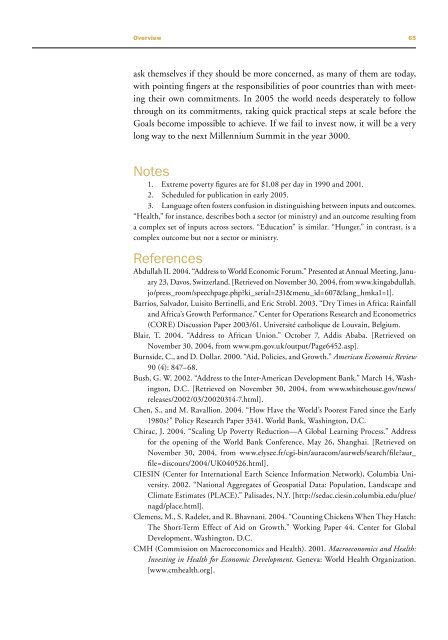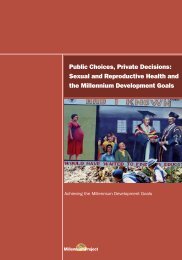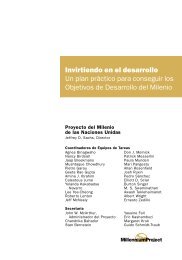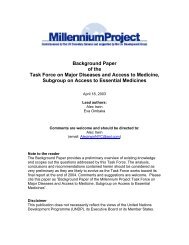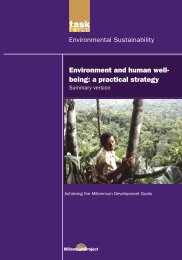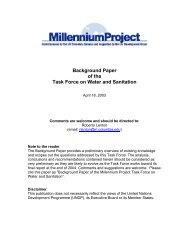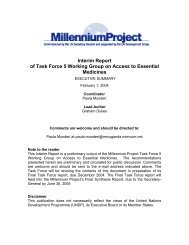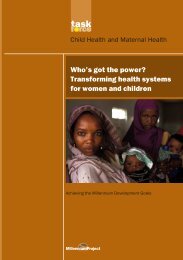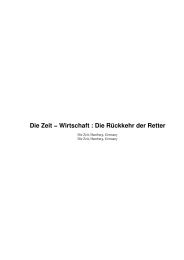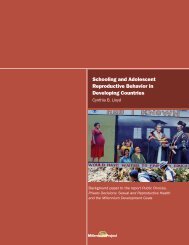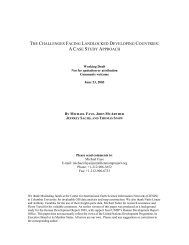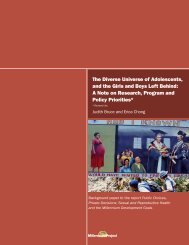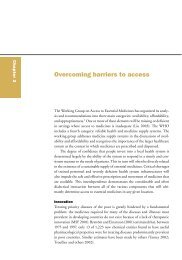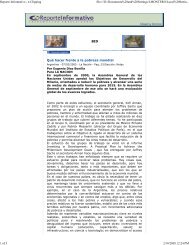Notes References - UN Millennium Project
Notes References - UN Millennium Project
Notes References - UN Millennium Project
You also want an ePaper? Increase the reach of your titles
YUMPU automatically turns print PDFs into web optimized ePapers that Google loves.
Overview<br />
65<br />
ask themselves if they should be more concerned, as many of them are today,<br />
with pointing fingers at the responsibilities of poor countries than with meeting<br />
their own commitments. In 2005 the world needs desperately to follow<br />
through on its commitments, taking quick practical steps at scale before the<br />
Goals become impossible to achieve. If we fail to invest now, it will be a very<br />
long way to the next <strong>Millennium</strong> Summit in the year 3000.<br />
<strong>Notes</strong><br />
1. Extreme poverty figures are for $1.08 per day in 1990 and 2001.<br />
2. Scheduled for publication in early 2005.<br />
3. Language often fosters confusion in distinguishing between inputs and outcomes.<br />
“Health,” for instance, describes both a sector (or ministry) and an outcome resulting from<br />
a complex set of inputs across sectors. “Education” is similar. “Hunger,” in contrast, is a<br />
complex outcome but not a sector or ministry.<br />
<strong>References</strong><br />
Abdullah II. 2004. “Address to World Economic Forum.” Presented at Annual Meeting, January<br />
23, Davos, Switzerland. [Retrieved on November 30, 2004, from www.kingabdullah.<br />
jo/press_room/speechpage.php?ki_serial=231&menu_id=607&lang_hmka1=1].<br />
Barrios, Salvador, Luisito Bertinelli, and Eric Strobl. 2003. “Dry Times in Africa: Rainfall<br />
and Africa’s Growth Performance.” Center for Operations Research and Econometrics<br />
(CORE) Discussion Paper 2003/61. Université catholique de Louvain, Belgium.<br />
Blair, T. 2004. “Address to African Union.” October 7, Addis Ababa. [Retrieved on<br />
November 30, 2004, from www.pm.gov.uk/output/Page6452.asp].<br />
Burnside, C., and D. Dollar. 2000. “Aid, Policies, and Growth.” American Economic Review<br />
90 (4): 847–68.<br />
Bush, G. W. 2002. “Address to the Inter-American Development Bank.” March 14, Washington,<br />
D.C. [Retrieved on November 30, 2004, from www.whitehouse.gov/news/<br />
releases/2002/03/20020314-7.html].<br />
Chen, S., and M. Ravallion. 2004. “How Have the World’s Poorest Fared since the Early<br />
1980s?” Policy Research Paper 3341. World Bank, Washington, D.C.<br />
Chirac, J. 2004. “Scaling Up Poverty Reduction—A Global Learning Process.” Address<br />
for the opening of the World Bank Conference, May 26, Shanghai. [Retrieved on<br />
November 30, 2004, from www.elysee.fr/cgi-bin/auracom/aurweb/search/file?aur_<br />
file=discours/2004/UK040526.html].<br />
CIESIN (Center for International Earth Science Information Network), Columbia University.<br />
2002. “National Aggregates of Geospatial Data: Population, Landscape and<br />
Climate Estimates (PLACE).” Palisades, N.Y. [http://sedac.ciesin.columbia.edu/plue/<br />
nagd/place.html].<br />
Clemens, M., S. Radelet, and R. Bhavnani. 2004. “Counting Chickens When They Hatch:<br />
The Short-Term Effect of Aid on Growth.” Working Paper 44. Center for Global<br />
Development, Washington, D.C.<br />
CMH (Commission on Macroeconomics and Health). 2001. Macroeconomics and Health:<br />
Investing in Health for Economic Development. Geneva: World Health Organization.<br />
[www.cmhealth.org].
66 Investing in Development: A Practical Plan to Achieve the <strong>Millennium</strong> Development Goals<br />
da Silva, Luiz Ignácio Lula. 2004. “Statement at the 59th Session of the <strong>UN</strong> General<br />
Assembly.” September 21, 2004, New York. [Retrieved on November 30, 2004, from<br />
www.brazil.org.uk/page.php?cid=1887].<br />
de Rato y Figaredo, Rodrigo. 2004. “Africa Needs International Help to Turn Promises<br />
into Progress.” Business Day, November 12.<br />
FAO (Food and Agriculture Organization). 2003. The State of Food Insecurity in the World.<br />
Rome.<br />
Harrison, M., J. Klugman, and E. Swanson. 2003. Are Poverty Reduction Strategies Undercutting<br />
the <strong>Millennium</strong> Development Goals? An Empirical Review. Washington, D.C.:<br />
World Bank.<br />
IDA (International Development Association) and IMF (International Monetary Fund).<br />
2003. “Republic of Mali: Poverty Reduction Strategy Paper Joint Staff Assessment.”<br />
[http://poverty.worldbank.org/files/Mali_PRSP_JSA.pdf].<br />
Kiszewski, A., A. Mellinger, A. Spielman, P. Malaney, S.E. Sachs, and J. Sachs. 2004. “A<br />
Global Index Representing the Stability of Malaria Transmission.” American Journal<br />
of Tropical Medicine and Hygiene 70(5):486–98.<br />
Koizumi, J. 2004. “A New United Nations for the New Era.” Address to the 59th Session<br />
of the General Assembly of the United Nations, September 21, New York. [Retrieved<br />
on November 30, 2004, from www.kantei.go.jp/foreign/koizumispeech/2004/09/<br />
21address_e.html].<br />
Miguel, E., S. Satyanath, and E. Sergenti. 2004. “Economic Shocks and Civil Conflict: An<br />
Instrumental Variables Approach.” Journal of Political Economy 112 (4): 725–53.<br />
Mkapa, Benjamin William. 2003. As cited in BBC Worldwide Monitoring. January 10.<br />
Dar-es-Salaam.<br />
———. 2004. “A Better Way to Help the Least Developed Countries.” International Herald<br />
Tribune July 13.<br />
Obasanjo, Olosagun. 2004. “Statement at the 59th Session of the United Nations General<br />
Assembly.” September 23, 2004, New York. [Retrieved on November 30, 2004, from<br />
www.un.org/webcast/ga/59/statements/nigeng040923.pdf].<br />
OECD/DAC (Organisation for Economic Co-operation and Development/Development<br />
Assistance Committee). Online DAC Database. [Retrieved on December 7, 2004,<br />
from www.oecd.org.<br />
———. Forthcoming. Development Co-operation Report 2005. Paris.<br />
Schröder, Gerhard. 2001. “Poverty Reduction—A Global Responsibility. Program of<br />
Action 2015.” Foreword. [www.gm-unccd.org/FIELD/Bilaterals/Ger/Halving.pdf]<br />
<strong>UN</strong> (United Nations). 1970. “Resolution 2626 (XXV).” United Nations General Assembly.<br />
October 24, New York.<br />
———. 2000. “United Nations <strong>Millennium</strong> Declaration.” A/RES/55/2, Section II. New<br />
York.<br />
———. 2002. “Report of the International Conference on Financing for Development.”<br />
A/CONF.198/11. New York.<br />
———. 2004. “A More Secure World: Our Shared Responsibility.” Report of the Secretary-General’s<br />
High-Level Panel on Threats, Challenges and Change. New York.<br />
<strong>UN</strong>DESA (United Nations Department of Economic and Social Affairs), Statistics Division.<br />
n.d. “World and Regional Trends.” <strong>Millennium</strong> Indicators Database; based on<br />
data provided by the United Nations Children’s Fund, World Health Organization,<br />
and Food and Agriculture Organization of the United Nations. [http://millenniumindicators.un.org/unsd/mi/mi_goals.asp]
<strong>References</strong><br />
67<br />
<strong>UN</strong>DP (United Nations Development Programme). 2003. Human Development Report<br />
2003: The <strong>Millennium</strong> Development Goals: A Compact among Nations to End Human<br />
Poverty. New York.<br />
———. 2004a. Unleashing Entrepreneurship: Making Business Work for the Poor. Report of<br />
the Commission on the Private Sector and Development to the <strong>UN</strong> Secretary-General.<br />
New York.<br />
———. 2004b. Human Development Report 2004. New York: Oxford University Press.<br />
<strong>UN</strong>-HABITAT. 2003. The Challenge of Slums: Global Report on Human Settlements 2003.<br />
Earthscan: London. [www.unchs.org/global_report.asp].<br />
<strong>UN</strong> <strong>Millennium</strong> <strong>Project</strong>. 2005a. Combating AIDS in the Developing World. Task Force<br />
on HIV/AIDS, Malaria, TB, and Access to Essential Medicines, Working Group on<br />
HIV/AIDS. New York.<br />
———. 2005b. Coming to Grips with Malaria in the New <strong>Millennium</strong>. Task Force on HIV/<br />
AIDS, Malaria, TB, and Access to Essential Medicines, Working Group on Malaria.<br />
New York.<br />
———. 2005c. Environment and Human Well-Being: A Practical Strategy. Task Force on<br />
Environmental Sustainability. New York.<br />
———. 2005d. Health, Dignity, and Development: What Will It Take? Task Force on Water<br />
and Sanitation. New York.<br />
———. 2005e. Halving Hunger: It Can Be Done. Task Force on Hunger. New York.<br />
———. 2005f. A Home in the City. Task Force on Improving the Lives of Slum Dwellers.<br />
New York.<br />
———. 2005g. Innovation: Applying Knowledge in Development. Task Force on Science,<br />
Technology, and Innovation. New York.<br />
———. 2005h. Investing in Strategies to Reverse the Global Incidence of TB. Task Force on<br />
HIV/AIDS, Malaria, TB, and Access to Essential Medicines, Working Group on TB.<br />
New York.<br />
———. 2005i. Prescription for Healthy Development: Increasing Access to Medicines. Task<br />
Force on HIV/AIDS, Malaria, TB, and Access to Essential Medicines, Working<br />
Group on Access to Essential Medicines. New York.<br />
———. 2005j. Taking Action: Achieving Gender Equality and Empowering Women. Task<br />
Force on Education and Gender Equality. New York.<br />
———. 2005k. Toward Universal Primary Education: Investments, Incentives, and Institutions.<br />
Task Force on Education and Gender Equality. New York.<br />
———. 2005l. Trade for Development. Task Force on Trade. New York.<br />
———. 2005m. Who’s Got the Power? Transforming Health Systems for Women and Children.<br />
Task Force on Child Health and Maternal Health. New York.<br />
———. 2005n. Handbook for MDG Best Practice. New York.<br />
United Nations Population Division. 2001. World Population Prospects: The 2001 Revision.<br />
Percentage of the Population at Mid-Year Residing in Urban Areas by Major<br />
Area, Region and Country, 1950–2030. Department of Economic and Social Affairs,<br />
New York.<br />
———. 2003. World Population Prospects: The 2002 Revision. Population Database.<br />
Department of Economic and Social Affairs, New York. [http://esa.un.org/unpp/].<br />
USAID (United States Agency for International Development), <strong>UN</strong>AIDS (Joint United<br />
Nations Programme on HIV/AIDS), WHO (World Health Organization), <strong>UN</strong>ICEF<br />
(United Nations Children’s Fund), and the POLICY <strong>Project</strong>. 2004. “Coverage of<br />
Selected Services for HIV/AIDS Prevention, Care and Support in Low and Middle<br />
Income Countries in 2003.” Washington, D.C.
68 Investing in Development: A Practical Plan to Achieve the <strong>Millennium</strong> Development Goals<br />
WHO (World Health Organization). 2002. “Scaling Up the Response to Infectious Diseases.”<br />
Geneva. [www.who.int/infectious-disease-report/2002/].<br />
WHO (World Health Organization), <strong>UN</strong>ICEF (United Nations Children’s Fund), and<br />
<strong>UN</strong>FPA (United Nations Population Fund). 2003. “Maternal Mortality in 2000:<br />
Estimates Developed by WHO, <strong>UN</strong>ICEF and <strong>UN</strong>FPA.” Geneva. [www.reliefweb.<br />
int/library/documents/2003/who-saf-22oct.pdf].<br />
World Bank. 2003. “Supporting Sound Policies with Adequate and Appropriate Financing.”<br />
Report DC2003-0016 prepared for the Development Committee. [http://<br />
siteresources.worldbank.org/DEVCOMMINT/Documentation/20127712/<br />
DC2003-0016(E)-Financing.pdf].<br />
———. 2004a. World Development Report 2005: A Better Investment Climate for Everyone.<br />
New York: Oxford University Press.<br />
———. 2004b. Doing Business in 2004: Understanding Regulation. Washington, D.C.<br />
———. 2004c. Global Development Finance 2004. Washington, D.C.<br />
———. 2004d. World Development Indicators 2004. Washington, D.C.<br />
For complete references, see the main report.
Acknowledgments<br />
Several people made particularly noteworthy contributions in the drafting<br />
process for this overview and the full-length version of the report. Macartan<br />
Humphreys played a central role in the drafting of chapter 12 on strategies for<br />
countries affected by conflict. Nirupam Bajpai, Shuming Bao, and Wing Thye<br />
Woo provided important analysis to inform chapter 11 on investment priorities<br />
in other regions. Deborah Balk, Bob Chen, Marc Levy, Alex de Sherbinin, Adam<br />
Storeygard, and their colleagues at the Center for International Earth Science<br />
Information Networks (CIESIN) at Columbia University conducted much of<br />
the report’s geospatial data analysis. Brian Hammond and his colleagues at the<br />
Organisation for Economic Co-operation and Development (OECD) Development<br />
Assistance Committee (DAC) gave tremendously of their time and<br />
expertise to inform the analysis in chapter 13 on fixing the donor system. Dani<br />
Kaufmann provided very helpful inputs to chapter 7 on governance. For all these<br />
chapters any remaining errors are the authors’ own.<br />
The <strong>UN</strong> <strong>Millennium</strong> <strong>Project</strong> benefited from active intellectual collaboration<br />
with François Bourguignon, Chief Economist of the World Bank;<br />
Nicholas Stern, his distinguished predecessor in that position and now at the<br />
U.K. Treasury; and Raghuram Rajan, Chief Economist of the International<br />
Monetary Fund (IMF). All were marvelously collaborative and thoughtful<br />
in sharing insights and comments on interim products and jointly pursuing<br />
the best possible analytical frameworks for achieving the MDGs. Many coorganized<br />
seminars and meetings benefited from the contributions of several of<br />
their colleagues, including Jim Adams, Shaida Badiee, Barbara Bruns, Mariam<br />
Claeson, Shanta Devarajan, Shahrokh Fardoust, Pablo Gottret, Rudolf Knippenberg<br />
(<strong>UN</strong>ICEF), Ibrahim Levent, Hans Lofgren, Gobind Nankani, John<br />
Page, Ramahatra Rakotomalala, Peter Roberts, Agnes Soucat, Eric Swanson,<br />
Jee-Peng Tan, Hans Timmer, and Dominique van der Mensbrugghe at the
70 Investing in Development: A Practical Plan to Achieve the <strong>Millennium</strong> Development Goals<br />
World Bank; and Sanjeev Gupta, Peter Heller, and Arvind Subramanian from<br />
the IMF.<br />
The <strong>UN</strong> <strong>Millennium</strong> <strong>Project</strong> also thanks its partners in developing a<br />
country-level MDG needs assessment methodology, the summary results of<br />
which are presented in chapter 17 on expanding the financial envelope to<br />
achieve the MDGs: Anwara Begum and M. Salimullah from the Bangladesh<br />
Institute for Development Studies; Kao Kim Hourn and Ray Zepp from the<br />
University of Cambodia; Ernest Aryeetey and Michael Nimo from the Institute<br />
of Statistical, Social and Economic Research in Ghana; Samar Datta, Ravindra<br />
Dholakia, and Akhilesh Kumar from the Indian Institute of Management,<br />
Ahmedabad; Haidari K. R. Amani, Flora Lucas Kessy, and Deogratias Macha<br />
from the Economic and Social Research Foundation in Tanzania; and Godfrey<br />
Bahiigwa, Lawrence Bategeka, and Nathan Okarut from the Economic<br />
Policy Research Center in Uganda. The <strong>UN</strong> <strong>Millennium</strong> <strong>Project</strong> is indebted<br />
to McKinsey & Company, which developed the analysis underlying the energy<br />
section of the needs assessment; to Eva Weissman for invaluable assistance in<br />
the child health and maternal health analyses; and to David Simon for analysis<br />
of official development assistance flows and their sectoral allocation. Shan<br />
Cao, Andrew Charlton, Stacy Fehlenberg, Joseph Kennedy, and Pierre Yared<br />
performed excellent research assistance in the needs assessment effort.<br />
Countless <strong>UN</strong>DP staff supported the <strong>Project</strong>’s efforts. Elli Kaplan was<br />
invaluable in supporting the <strong>Project</strong>’s early stages. Jeffrey Avina, Ade Lekoetje,<br />
Elizabeth Lwanga, Jacques Loup, Lamin Manneh, and Comfort Tetteh were<br />
also tremendous contributors to the <strong>UN</strong> <strong>Millennium</strong> <strong>Project</strong>’s day-to-day<br />
work. Sally Fegan-Wyles and her team at the <strong>UN</strong> Development Group were<br />
ever helpful and supportive. Major substantive contributions were made from<br />
throughout the Bureau for Development Policy, including: Susan McDade and<br />
the energy group; Antoine Heuty, Terry McKinley, Rathin Roy, and colleagues<br />
in the poverty group; Gita Welch and the institutional development group;<br />
and Terence Jones and his team from the capacity development group. Djibril<br />
Diallo, David Morrison, Bill Orme, and their COA colleagues provided<br />
invaluable communications support. The <strong>Project</strong> also thanks the MDG focal<br />
points from the other regional bureaux: Ghaith Fariz, Enrique Ganuza, Balasubramanium<br />
Murali, and Norimasa Shimomura. Pedro Conceição, Moez<br />
Doraid, Gulden Turkoz-Cosslett, Mattias Johansson, Inge Kaul, Ronald Mendoza,<br />
Omar Noman, Alejandra Pero, Bharati Sadasivam, Amina Tirana, and<br />
Caitlin Wiesen were also extremely generous with their contributions. Nissim<br />
Ezekiel and the secretariat of the Commission on Private Sector and Development<br />
offered many helpful suggestions, including Jan Krutzinna, Naheed<br />
Nenshi, Yann Risz, and Sahba Sobhani.<br />
The <strong>UN</strong> <strong>Millennium</strong> <strong>Project</strong> collaborated closely with the staff of the<br />
Human Development Report Office in the production of Human Development<br />
Report 2003. Several parts of this report build on work conducted during the
Acknowledgments<br />
71<br />
production of that Report. We thank Sakiko Fukuda-Parr and her team, including:<br />
Silva Bonacito, Emmanuel Boudard, Carla De Gregorio, Haishan Fu, Claes<br />
Johansson, Christopher Kuonqui, Santosh Mehrotra, Tanni Mukhopadhyay,<br />
Stefano Pettinato, David Stewart, Aisha Talib, Nena Terrell, and Emily White.<br />
This report was edited and produced by the stellar team of Bruce Ross-<br />
Larson, Meta de Coquereaumont, Mary Goundrey, Thomas Roncoli, Christopher<br />
Trott, Timothy Walker, and Elaine Wilson at Communications Development<br />
Incorporated in Washington, D.C.<br />
Advisory inputs<br />
Many colleagues shared important comments on earlier drafts of this report.<br />
Members of the <strong>UN</strong> <strong>Millennium</strong> <strong>Project</strong>’s United Nations Experts Group have<br />
provided invaluable advice since the <strong>Project</strong>’s inception, always under the skilled<br />
chairmanship of Jan Vandemoortele. We thank all Experts Group members for<br />
their generous and consistent contributions: Ifzal Ali, Adnan Z. Amin, Patrick<br />
Asea, Daniel Biau, François Bourguignon, James P. Callahan, Andrew Cassels,<br />
Jan Cedergren, Hans D’Orville, David T. Edwards, Marika Fahlen, Orobola<br />
Fasehun, Luiz L. Fernandes Pinheiro, Charles Gore, Edward Heinemann, Raj<br />
Jumar, Ian Kinniburgh, Eddy Lee, Patrick Low, Richard Morgan, Harish Parvathaneni,<br />
Prabhu Pingali, Raghuram Rajan, Joanne Sandler, Francisco Sercovich,<br />
Mari Simonen, Joseph Smolik, Dianne Spearman, Carlos Eduardo Velez,<br />
and Gustavo R. Zlauvinen.<br />
Special thanks are also due to colleagues at the <strong>UN</strong> Secretariat: in particular<br />
Henk-Jan Brinkman, Marta Mauras, Robert Orr, and Abiodun Williams<br />
in the Executive Office of the Secretary-General. Ibrahim Gambari,<br />
Eloho Otobo, and Yvette Stephens provided tremendous support from the<br />
office of the Secretary-General’s Special Advisor on Africa. In the Department<br />
of Public Information, Sue Markham, Pragati Pascale, and Tim Wall<br />
offered tremendous assistance. Numerous colleagues in the Department of<br />
Economic and Social Affairs provided tremendous support throughout the<br />
<strong>Project</strong>, including Joseph Chamie and his team at the Population Division;<br />
Robert Johnston, Francesca Perucci, and the team in the Statistics Division;<br />
and Johan Schölvinck.<br />
The <strong>UN</strong> <strong>Millennium</strong> <strong>Project</strong> also benefited from collaboration with colleagues<br />
at the <strong>Millennium</strong> Campaign: including Eveline Herfkens, Salil Shetty,<br />
Fernando Casado, Nisha Chatani-Rizvi, Patricia Garce, Lucille Merks, Marina<br />
Ponti, Ingrid Sanders, Marisol Sanjines, Hellen Wangusa, Carol Welch, and<br />
Erna Witoelar.<br />
The <strong>UN</strong> <strong>Millennium</strong> <strong>Project</strong> is grateful for its collaboration with and<br />
comments from the Secretariat of the New Partnership for African Development<br />
(NEPAD), including its distinguished chair Wiseman Nkuhlu, its agricultural<br />
advisor Richard Mkandawire, and its indefatigable MDG specialist,<br />
Khadija Bah.
72 Investing in Development: A Practical Plan to Achieve the <strong>Millennium</strong> Development Goals<br />
The <strong>UN</strong> <strong>Millennium</strong> <strong>Project</strong> benefited from several high-level consultations<br />
with members of the OECD/DAC. The <strong>Project</strong> gratefully acknowledges<br />
the Government of Sweden for hosting a high-level discussion in Stockholm in<br />
February 2004. The <strong>Project</strong> also thanks Richard Manning, Brian Hammond,<br />
and colleagues for convening a meaning of DAC leaders in Paris in July 2004.<br />
Masood Ahmed, Richard Martini, Sharon White, and colleagues in the UK<br />
Department for International Development also hosted an extremely constructive<br />
final consultation with DAC members in London during October 2004. The<br />
<strong>Project</strong> also thanks Jean-Pierre Landau for numerous helpful conversations.<br />
Pilot country inputs<br />
The <strong>UN</strong> <strong>Millennium</strong> <strong>Project</strong>’s pilot country work provided an invaluable<br />
forum for testing many of the ideas highlighted in this report and for gathering<br />
new information. In Cambodia, Dominican Republic, Ethiopia, Kenya,<br />
Ghana, Senegal, Tajikistan, and Yemen, the <strong>UN</strong> Resident Coordinator, <strong>UN</strong><br />
Country Team members, the World Bank, and the International Monetary<br />
Fund all provided significant support to the collaboration. The <strong>Project</strong> is especially<br />
grateful to the heads of government in several countries for their direct<br />
and active support, including President Leonel Fernández of the Dominican<br />
Republic, Prime Minister Meles Zenawi of Ethiopia, President John Kufuor<br />
of Ghana, President Mwai Kibaki of Kenya, President Abdoulaye Wade of<br />
Senegal, and President Emomali Rakhmonov of Tajikistan. Government focal<br />
points in the pilot countries include John Gagain in the Dominican Republic;<br />
Ato. Mekonnen Manyazewal and Ato. Getachew Adem in Ethiopia; S. Nii-Noi<br />
Ashong and George Gyan-Baffour in Ghana; David Nalo and George Anyango<br />
in Kenya; Abou Lom in Senegal; Nozigul Khushvakhtova in Tajikistan;<br />
and Ahmed Mohammed Sofan and Mutahar Al-Abassi in Yemen.<br />
The <strong>UN</strong> Resident Coordinator and the <strong>UN</strong> Country Teams have been<br />
instrumental in leading the pilot country work. We particularly thank Douglas<br />
Gardner and Barbara Orlandini in Cambodia; Niky Fabiancic in the Dominican<br />
Republic; Samuel Nyambi, Modibo Toure, Bjorn Ljungqvist, and Vinetta<br />
Robinson in Ethiopia; Alfred Fawundu and Kamil Kamaluddeen in Ghana;<br />
Paul André de la Porte and Ojijo Odhiambo in Kenya; Ahmed Razhaoui,<br />
Albéric Kacou, Luc Grégoire, and Diene Keita in Senegal; William Paton,<br />
Tuya Altangerel, Oliver Babson, Temur Basilia, and Johannes Chudoba in<br />
Tajikistan; and Flavia Pansieri, James Rawley, Samuel Choritz, Sammy Khan,<br />
and Abdo Seif in Yemen.<br />
The <strong>UN</strong> <strong>Millennium</strong> <strong>Project</strong>’s MDG Technical Support Center in Nairobi<br />
has helped to guide the pilot country work in Africa. We thank Glenn<br />
Denning, Mi Hua, Patrick Milimo, Eileen Petit-Mshana, and Salina Sanou<br />
for their contributions. The <strong>Project</strong> thanks Lenora Suki and Tarik Yousef for<br />
their efforts in helping to lead the <strong>Project</strong>’s collaborations in the Dominican<br />
Republic and Yemen respectively. Several WHO staff, especially Rebecca
Acknowledgments<br />
73<br />
Dodd, Jeanette de Putter, and Sergio Spinaci, have collaborated closely on the<br />
health-related activities in Yemen.<br />
Report comments<br />
We gratefully acknowledge the thoughtful comments and suggestions received<br />
from many governments; <strong>UN</strong> agencies, funds, and programs; civil society organizations;<br />
and individuals. We thank the governments of Australia, Belgium,<br />
Canada, CARICOM member states, China, Denmark, Finland, France, Germany,<br />
Ireland, Italy, Japan, the Netherlands, New Zealand, Norway, South<br />
Africa, Spain, Switzerland, Tunisia, the United Kingdom, the United States,<br />
and the members of the European Commission for their comments.<br />
The <strong>UN</strong> <strong>Millennium</strong> <strong>Project</strong> benefited tremendously from many group<br />
consultations at the United Nations and thanks all who participated in and<br />
organized these events. This includes meetings with the ambassadors of the<br />
African Union, convened by Michel Kafando and Crispin Grey-Johnson; the<br />
ambassadors of the Caribbean Community, convened by Christopher F. Hackett;<br />
the ambassadors of the Pacific Islands Forum Group, convened by Ali’ioaiga<br />
Feturi Elisaia; ambassadors of the <strong>UN</strong> Economic and Social Council, convened<br />
by Marjatta Rasi; members of the Second Committee of the General Assembly,<br />
convened by Marco Balarezo; and members of the Group of 77 and China,<br />
convened by Abdulaziz Al-Nasser. We also thank <strong>UN</strong> delegates representing<br />
member states of the European Union, as convened by Koen Davidse.<br />
We would also like to thank Kanta Adhin, Javed Ahmad, Benjamin Allen,<br />
Ifzal Ali, Aasmund Andersen, William Andrianasolo, James Banda, Tony Banks,<br />
Pierre Belanger, Clements Bidonge, Kate Bird, Bineswaree (Aruna) Bolaky,<br />
Catherine Budgett-Meakin, Barbara Burungi, M. Bukuru, Eva Busza, Bernardo<br />
Cachaca, Wendy Caird, Joana Chamusca, Erin Chapman, Bill Christeson,<br />
Anthony Costello, Jacek Cukrowski, Susanne Dam-Hansen, Denis Daumerie,<br />
Rossana Dudziak, Zamira Eshmambetova, Marcos A Espinal, Udo Etukudo,<br />
Richard Feachem, Virginia Floyd, Luc Franzoni, Dennis Garrity, Axumite<br />
Gebre-Egziabher, Adrienne Germain, Linda Ghanimé, Stefan Giljum, Genevieve<br />
Grabman, Peter Gustafsson, Toni Haapane, Lawrence Haddad, Ronnie<br />
Hall, Afaf Abu-Hasabo, Cecil Haverkamp, Ron Heller, Karen Judd, Inge Kaul,<br />
Jeff Keenan, Augusta Khew, Shannon Kowalski-Morton, Hannu Kyröläinen,<br />
Robert Leigh, Jostein Leiro, Lim Li Lin, Jon Linden, Dermot Maher, James<br />
Manor, Mariam Mayet, Christine McNab, Lenni Montiel, Tadayuki Miyashita,<br />
Ronan Murphy, Adib Nehmeh, Norm Nicholson, Samantha Page, Erik<br />
Parsons, Joanna Patrick, Bob Perciasepe, Peter Piot, Rathi Ramanathan, Mary<br />
Robinson, Rick Rowden, Rabbi Royan, Domenico Siniscalco, Charlotte Hord<br />
Smith, William Smith, Jamil Sofi, Elsa Stamatopoulou, Carsten Staur, Thomas<br />
Theisohn, Adama Toe, John Tucker, Happy James Tumwebaze, Therese<br />
Turner-Jones, Andras Uthoff, Louisa Vinton, Rob Ward, Robert Watson, Patrick<br />
Webb, Diana Weil, Pera Wells, Caron Whitaker, and David Woollcombe.
74 Investing in Development: A Practical Plan to Achieve the <strong>Millennium</strong> Development Goals<br />
We also thank faculty at the Institute for Development Studies, Sussex, and the<br />
faculty and students of the Graduate School of International Studies at the University<br />
of Denver for their detailed analysis and comments on previous drafts.<br />
For the needs assessment work, in addition to task force members, we also<br />
gratefully acknowledge comments and suggestions by Tahgreed Adam, Walid<br />
Badawi, Christopher Banes, Stefano Bertozzi, Razina Bilgrami, Jonathan Campaign,<br />
Tamo Chattopadhay, Mark Connolly, Ingrid Cyimana, Billy Cobbett,<br />
Joel Cohen, Chris Curtis, Ernest Darkoh, Don de Savigny, Richard Deckelbaum,<br />
Simon Ellis, Patrice Engle, David Evans, Katherine Floyd, Joe Flood,<br />
Tamara Fox, Linda Ghanime, Rainer Gross, Juan Pablo Gutierrez, Charlie<br />
Heaps, John Hendra, Mark Henderson, Andrew Hudson, Jose Hueb, Todd<br />
Johnson, Eileen Kennedy, Will Keogh, Zahia Khan, Chistoph Kurowski, Lilani<br />
Kumuranyake, Valerie Leach, Rolf Luyendijk, Pim van der Male, William<br />
McGreevey, Metsi Mekheta, Takaaki Miyaguchi, Cielo Morales, Maryam<br />
Niamir-Fuller, Elizabeth Anne Paxton, Vinod Paul, Kyoko Postill, David Redhouse,<br />
Sanjay Reddy, Harri Seppanen, Kavita Sethuraman, Manohar Sharma,<br />
Susmita Shekhar, Henri Smets, Lara Stabinski, John Stover, Daouda Toure,<br />
Juha Uitto, Meike van Ginneken, Netsanet Walelign, Jake Werksman, Edward<br />
Wilson, Meg Wirth, and Aster Zaoude.<br />
Administrative support<br />
This report could not have been produced without the tireless administrative<br />
support of Jennifer Copeland, Rosemary Estevez-Vidal, Hnin Hla Phyu,<br />
and Ferima Traore in the <strong>UN</strong> <strong>Millennium</strong> <strong>Project</strong> Secretariat; Lauren Canning-Luckenbach<br />
and Alan Lee in the Office of the <strong>UN</strong>DP Administrator;<br />
Patricia Maw and Alex Nitorreda in the MDGs Unit of <strong>UN</strong>DP; and Ji Mi<br />
Choi, Deborah Creque, Heidi Kleedtke, and Martha Synnott at the Earth<br />
Institute at Columbia University. Dan Nienhauser of the Earth Institute was a<br />
staunch supporter of the <strong>Project</strong>, helping to streamline many of its administrative<br />
needs.


